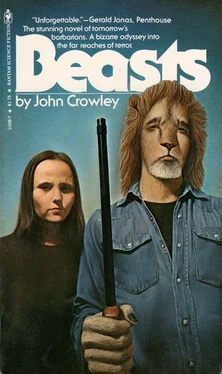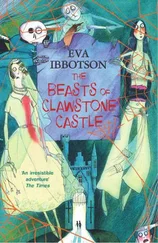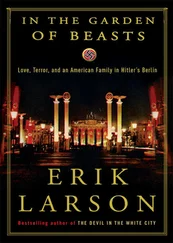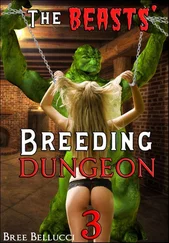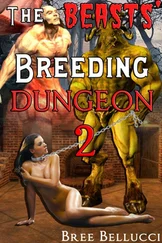“Wolves and hawks,” Emma said, “don’t use rifles.” She picked up the message. “Shot with old-style high-caliber ballistic weapon. Liver, heart removed, and most of the long muscle. Rest in a high state of decomposition.”
Meric saw in his mind an image from the Birthday Show, a bit of some long-dead family-man’s home movies, he assumed: hunters, laughing and proud, in antique dress, surrounded a deer, shot, presumed dead. The deer suddenly twitched, its eye rolling, blood gushing from its mouth. The men appeared startled at first; then one drew a long blade, and as the others stood near, brave beside this thing so nearly dead, he slashed the deer’s throat. It seemed easy, like slashing a rubber bag. Blood rushed out, far more than seemed likely. Emma’s voice said: “As ye do unto these, the least of my brethren, you do unto me.” He’d always (however often, with repugnance, he passed this scene in his workprints) wondered what those men had felt: any remorse, any disgust even? He had read about the joy of the hunt and the capture; but that was over, here. Shame? Dread? That blood: that eye.
“Let me go,” he said. “I’d be back in a week.”
“You’d have to be careful. They’re armed.” She said the word as though it took courage to say, as though it were obscene.
“ Enemy is a name for someone you don’t know.” It was a proverb of the Mountain’s. “I’ll be careful.”
The rest of that day he prepared his equipment, making as certain as he could that it would function, working from a checklist of emergency spares and baling-wire (a term he used, without knowing what it had once meant, for little things he found useful for making repairs, making do). In the evening he went to visit friends, borrowing things to make up a pack. He took a scabbard knife.
He lay that night sleepless as well.
“It makes me nervous,” Bree said to him. “How long will you be?”
“Not long. A week.” He took her wrist, brown and smooth as a sapling.
“I’ll tell you what,” he said. “If I’m not back in a week, send a pneumo to Grady. Tell him something’s up, and to come on if he thinks it’s right.”
Grady was a ranger whom Bree had once had an affair with: brown as she was, but humorless, dense, as hard and reliable as she was evanescent. He was a member of the small, highly trained team in the Mountain allowed weapons — net-guns, tranquilizing guns, theoretically only for wildlife.
Wildlife.
“Grady would know,” Bree said, and withdrew her wrist from his hand. She didn’t like to be touched while she slept.
He’d often wondered what Bree and Grady had been for each other. Bree had been frank about other lovers she’d had. About Grady, when he asked, she only said, “It was different,” and looked away. He wanted to ask more, but he sensed the door shut.
He wanted to see . He wanted to enter into darkness, any darkness, all darkness, and see in it with sudden cat’s eyes: nothing withheld. He realized, at the moment Bree took her wrist from him, that this was his nature: it was a simple one, but it had never been satisfied. Not so far.
Genesis Preserve occupied a space in the northwest of the Northern Autonomy about where the heart would be in a body. The multilane freeways that cut it into irregular chambers were used now only by crows, who dropped snails onto them from heights to break the shells. Two hundred years ago it had been farms, hard-scrabble Yankee enterprises on a difficult frontier. Never profitable, the farmers had mostly given up by the beginning of the twentieth century, though the stone houses they had made by gleaning glacier-scattered fieldstone from their pastures remained here and there, roofless and barnless, home for owls and swallows. It had never ranked high in the last century’s ephemeral vacation places: no real mountains to ski in the cruel winters, and an unlovely, barren upland in summer. Yet, by count, its swamps and variegated woods, its rocky fields and dense meadows harbored more varieties of life than did most equivalent cuts of earth. And it belonged to no one but them.
Meric was no outdoorsman. It was a skill few in the Mountain possessed, though many held it up as an ideal; it was thought to require a special kind of careful expertise, like surgery. He bore his time on the ground well, though; life in the Mountain was austere enough that short rations of dull food, cold nights, long walking didn’t seem to be hardship. That was more or less how life was most of the time. And the solitudes, the sense that he was utterly alone in an unpeopled place that didn’t want him there and would take no notice if, say, he fell down rocks and broke a leg, the hostility of night and its noises that kept his sleep fitful, all this seemed to be as it should. He had no rights in the Preserve: its princes, who protected it, were, when they entered it, nothing.
On the second day, toward evening, he came in sight of the pride.
He stayed well away, behind cover of a brush-overgrown wall, on a rise above where they had made camp. From his pack he chose a telephoto lens and, with an odd shiver as though the false nearness it gave him could make them somehow conscious of him as well, he began his spying.
They had chosen one of the roofless stone farmhouses as a base or a windbreak. Smoke from a fire rose up from within it. Around it were two or three carelessly pitched tents; a paintless and ancient four-wheel van; a kind of gypsy wagon of a sort he’d never seen before, and a hobbled mule near it, cropping. And there was an expertly made construction of poles and rope, a kind of gallows, from which hung, by its delicate hind legs, a deer. A doe. Focusing carefully, Meric could see the carcass turning very slowly in the breeze. There was no other movement. Meric felt the tense expectancy of a voyeur watching an empty room, waiting.
What was it that suddenly made him snap his head around with a stifled cry? Perhaps while his eyes were concentrating on the camp, other senses were gathering small data from his surroundings, data that added up without his being aware of it till an alarm went off within him.
Some fifty feet behind him a young male leo squatted in the grass, long gun across his knees, watching him steadily, without curiosity or alarm.
“What is it you want?” Emma Roth said coldly, hoping to imply that whatever it was they wanted, they had no chance of getting it.
The three Federal agents before her, to whom she hadn’t offered seats, looked from one to another as though trying to decide who should do the talking. Only the thin, intent one in a tight black suit, who hadn’t produced credentials, remained aloof.
“A leo,” one of them said at last, producing a dossier or file of some kind and exhibiting it to Roth, not as though he meant her to examine it, but only as a kind of ritual object, a token of his official status. “We have reason to believe that there is an adult male leo within the Preserve, who at one time called himself Painter. He’s a murderer and a kidnapper. It’s all here.” He tapped the file. “He abducted an indentured servant north of the border and fled south. In the process he murdered — with his bare hands” — here the agent exhibited his own meaty ones — “an officer of an official Federal search party on other business.”
“He murdered him on other business?” God, she hated the way they talked: as though it weren’t they but some dead glum bureaucratic deity who spoke through them, and they were oracles only and had nothing to do with it.
“The officer was on other business,” the agent said.
“Oh”
“We understand there is a formality to go through about getting safeconducts or warrants to go into the Preserve and make an arrest.”
Читать дальше
